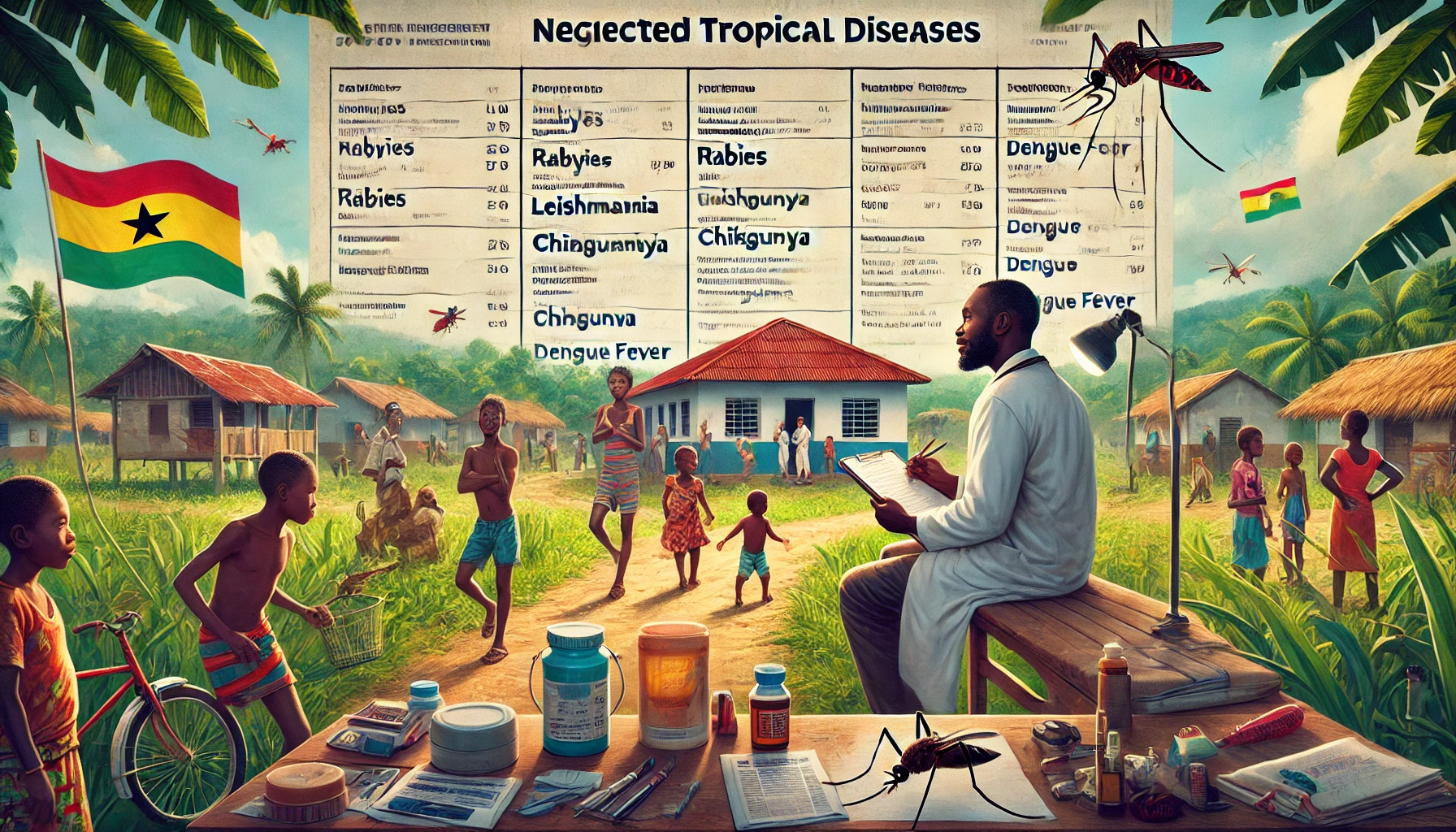
Rickettsial Diseases, Rabies, Leptospirosis, Leishmaniasis, Chikungunya, Zika, And Dengue Fever 🌡️😷
Diseases such as rickettsial infections, rabies, leptospirosis, leishmaniasis, chikungunya, Zika, and dengue fever can pose serious health risks in Ghana. While many Ghanaians might know about these diseases, misunderstandings and myths often delay proper treatment. In this article, we will explain:
- What causes these diseases
- Common signs and symptoms
- Treatment options and complications
- Common myths and facts
Images are only illustrative; may not pass an academic critique
PART 1: RICKETTSIAL DISEASES
Causes
- Rickettsial diseases are caused by bacteria called Rickettsia.
- These bacteria are transmitted to humans through the bites of infected ticks, fleas, lice, or mites.
Common Signs and Symptoms
- Fever, chills, and severe headaches.
- Body aches or muscle pain.
- Sometimes a rash that starts on the wrists and ankles and can spread to other parts of the body.
Treatment
- Antibiotics (e.g., doxycycline) are effective if taken early.
- Rest and adequate hydration are important.
Complications
- Untreated rickettsial infections can lead to severe organ damage, serious infections of the heart and brain, or even death.
Myths and Concerns
- Myth: Some people may think rickettsial diseases are caused by “spiritual attacks” and visit traditional healers first.
- Fact: These diseases are bacterial infections passed by insect or mite bites. Proper medical care is critical.
Images are only illustrative; may not pass an academic critique
PART 2: RABIES
Causes
- Rabies is caused by a virus.
- Spread mainly through bites or scratches from infected animals, especially dogs.
Common Signs and Symptoms
- Early symptoms include fever, headache, and a general feeling of being unwell.
- As the disease worsens:
- Excessive salivation or drooling
- Fear of water (hydrophobia)
- Hallucinations, confusion
- Aggressive behavior or extreme restlessness
Treatment
- Prevention is key:
- Vaccinate pets (especially dogs) against rabies.
- If bitten, wash the wound thoroughly with soap and water for 15 minutes and seek medical care immediately.
- Post-exposure vaccination can prevent the virus from causing illness if given promptly.
Complications
- Once symptoms start, rabies is almost always fatal.
- Early treatment with rabies vaccine and immunoglobulin is crucial.
Myths and Concerns
- Myth: Some believe applying herbs or ointments on a dog bite can stop rabies.
- Fact: Only proper wound washing and timely vaccination can stop the virus.
Images are only illustrative; may not pass an academic critique
PART 3: LEPTOSPIROSIS
Causes
- Caused by Leptospira bacteria.
- Infection typically happens when water or soil containing animal urine (from rats, mice, farm animals, etc.) contacts the eyes, mouth, nose, or broken skin.
Common Signs and Symptoms
- Fever, chills, and muscle aches.
- Headache, vomiting, or diarrhea.
- In severe cases, jaundice (yellowing of the eyes and skin) or kidney failure.
Treatment
- Antibiotics (doxycycline or penicillin) prescribed early can help.
- Supportive care such as fluids, rest, and, in severe cases, hospitalization.
Complications
- Liver damage, kidney failure, internal bleeding, or even death if untreated.
Myths and Concerns
- Myth: Some believe that drinking herbal concoctions will cure leptospirosis instantly.
- Fact: Antibiotics and supportive care are proven to be most effective.
Images are only illustrative; may not pass an academic critique
PART 4: LEISHMANIASIS
Causes
- Caused by parasites called Leishmania.
- Spread by the bite of infected sand flies, which are smaller than mosquitoes and can be harder to notice.
Common Signs and Symptoms
- Cutaneous (skin) leishmaniasis: Skin sores or ulcers that may appear weeks or months after the bite.
- Visceral (internal) leishmaniasis: Fever, weight loss, enlarged spleen or liver, and anemia (low blood count).
Treatment
- Antiparasitic medications (e.g., pentavalent antimonials, miltefosine).
- Proper wound care if sores appear on the skin.
Complications
- Untreated, visceral leishmaniasis can cause severe organ damage and can be fatal.
- Skin infections from ulcers.
Myths and Concerns
- Myth: Rubbing plant leaves on skin lesions will heal them.
- Fact: Proper medical diagnosis and antiparasitic medication is needed for effective treatment.
PART 5: CHIKUNGUNYA, ZIKA, AND DENGUE FEVER
These three diseases are all transmitted through the bite of infected Aedes mosquitoes. Many symptoms overlap, but each has unique concerns.
A. CHIKUNGUNYA
Causes
- Viral infection spread by Aedes mosquitoes.
Common Signs and Symptoms
- Sudden high fever.
- Severe joint pains (common in ankles, knees, wrists).
- Headaches, muscle pain, and fatigue.
Treatment and Complications
- No specific cure—treatment focuses on easing symptoms:
- Pain relievers (e.g., paracetamol).
- Rest and drink plenty of fluids.
- Joint pain can sometimes last for months or even years.
Myths
- Myth: Some say chikungunya is just “normal malaria” and does not need special attention.
- Fact: While it shares some symptoms, a lab test is needed to confirm, and it is caused by a different virus.
Images are only illustrative; may not pass an academic critique
B. ZIKA
Causes
- Zika virus spread by Aedes mosquitoes.
- Can also be transmitted from a pregnant woman to her unborn baby.
Common Signs and Symptoms
- Often mild or no symptoms.
- Can include fever, rash, joint pain, red eyes.
- In pregnant women, Zika can cause birth defects in babies (like microcephaly—small head and brain).
Treatment and Complications
- No specific treatment—rest, fluids, pain relievers (e.g., paracetamol) recommended.
- Zika’s main concern is potential harm to unborn babies if the mother is infected during pregnancy.
Myths
- Myth: Some believe Zika is a curse on pregnant women.
- Fact: Zika is a mosquito-borne viral disease; protecting yourself from mosquito bites is vital.
C. DENGUE FEVER
Causes
- Caused by the dengue virus, spread by Aedes mosquitoes.
Common Signs and Symptoms
- Sudden high fever.
- Severe headache, pain behind the eyes.
- Muscle and joint pains.
- Skin rash.
Treatment and Complications
- No specific cure—treatment focuses on rest, fluids, and pain relievers (avoid ibuprofen, use paracetamol).
- Severe dengue (dengue hemorrhagic fever) can cause bleeding, organ failure, and can be fatal without prompt medical care.
Myths
- Myth: Some believe “bitter” herbal drinks can treat dengue fever.
- Fact: There is no known herbal cure. Proper medical attention is necessary to avoid serious complications.
Images are only illustrative; may not pass an academic critique
HOW TO PROTECT YOURSELF AND OTHERS
- Preventive Measures for All Mosquito-Borne Diseases:
- Use insect repellents, wear long sleeves and trousers.
- Sleep under treated mosquito nets.
- Empty stagnant water in pots, tyres, and other containers where mosquitoes breed.
- Vaccination:
- Ensure pets, especially dogs, are vaccinated against rabies.
- Stay informed about recommended vaccines or prophylaxis for certain diseases if they become available.
- Maintain Good Hygiene:
- Wash hands often with soap and clean water.
- Keep the environment clean and properly dispose of waste.
- Early Medical Attention:
- Visit a healthcare facility if you have persistent fever, unusual skin rashes, severe headaches, or other troubling symptoms.
- Do not rely on unproven traditional remedies; modern medicine can save lives when accessed quickly.
ADDRESSING COMMON MYTHS AROUND TRADITIONAL HEALERS
- Myth: Traditional healers have “spiritual cures” for all diseases.
- Fact: While some herbs may ease minor symptoms, many serious diseases like rabies, dengue, Zika, and leishmaniasis need proper medical treatment. Delaying modern care can lead to complications or death.
- Myth: Boiling certain leaves and inhaling the steam cures infections.
- Fact: Inhaling steam may temporarily relieve congestion or breathing difficulties but does not kill bacteria, viruses, or parasites causing these diseases.
CONCLUSION
Diseases like rickettsial infections, rabies, leptospirosis, leishmaniasis, chikungunya, Zika, and dengue fever can be life-threatening if not treated properly and on time. Protect yourself by avoiding mosquito bites, maintaining good hygiene, vaccinating your pets, and seeking immediate medical attention when you notice unusual symptoms. Remember:
- Early recognition and treatment save lives.
- Preventive measures (e.g., nets, repellents, sanitation) reduce the spread.
- Do not let myths delay proper medical care.
When in doubt, visit a trusted healthcare facility or consult a qualified medical professional for accurate diagnosis and treatment. Your health is your wealth—stay informed, stay safe, and help spread awareness among friends and family.
- Battling the Unseen: The Truth About Neglected Tropical Diseases 🧟♂️
- Hepatitis A|B|C|D|E In Ghana: A Practical Guide For Everyone 💉⚠️🦠
- 🇬🇭 Typhoid in Ghana: Are You at Risk? Spot the Signs Early 🦠🌡️
- The Ultimate Guide on Common Infections in Ghana📖: What You Need to Know and How to Stay Healthy 🤒🦠🏥
- 🐍🌳 Snake Bites: MUST KNOW For All Ghanaians

We Love to Educate for Free
But please do not self-medicate as wrong doses of even correct medications can cause serious complications like kidney failure and even death. You can talk to a LICENSED health professional (including medical doctors, specialists, physician assistants, clinical psychologists, nutritionists/dieticians, medical herbalists, etc) by downloading the Deluxe Hospital app here:










